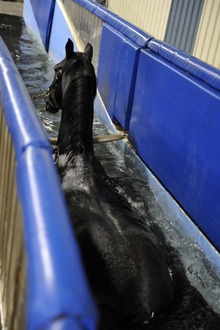Some veterinarians recommend swimming as a means of exercise for horses that need to avoid the concussive force of normal walking, trotting or galloping. Swimming allows horses to move strongly enough to get an aerobic workout while avoiding the joint concussion normally associated with weight-bearing exercise.

Swimming as exercise for horses
When researchers studied records from three equine hospitals, they analyzed 21 additional swimming-associated colics that required surgery.
© 2012 by Carien Schippers
Some horses have developed colic signs after swimming. A study at the University of Melbourne looked at the frequency of colic cases associated with swimming. For the purposes of this study, a colic case was seen as associated with swimming if the horse showed colic signs within 30 minutes after leaving the swimming pool. When the researchers analyzed colic cases treated at one large equine hospital, results showed that only one out of every 1,200 colics during the three-year study period was considered to be swimming-related. Prognosis was good for all affected horses, and all recovered, although five horses required surgery.
When the researchers studied records from three more equine hospitals, they analyzed 21 additional swimming-associated colics that required surgery. One horse was euthanized after surgery but the others survived, and 18 of the 21 went on to race.
It is difficult to say that swimming absolutely did or did not cause colic signs in any of these horses. There are many types and multiple causes of abdominal pain in horses, and it is possible that swimming increases the risk in some horses at some times. Owners and managers should be aware that colic is common in the general equine population, and should contact a veterinarian any time a horse shows signs of abdominal discomfort.
